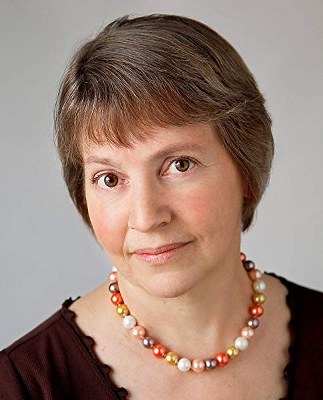Jenny climbed the stairs trying to look carefree, in case any of the other girls was watching. Not much point to it — they all knew. It was never good news if Madam Mamie called you up to her office. If she was pleased with you, she’d come and find you and give you a kind word or a side-hug or maybe a cash bonus. The office was for scolding a girl, or even warning her that she’d come to her last chance and might be out on her ear soon.
Jenny had a pretty good idea what the trouble was. It wore a fancy frock coat, smoked cigars too smelly for what they cost, and had looked down his nose at her when he left that afternoon.
Mamie’s door was open, but as soon as Jenny showed up, Mamie waved her in, stood up, and closed it. Jenny’s belly went cold. Would Mamie kick her out, just because one client didn’t find her as much to his taste as he’d reckoned? Where could she go? The sheriff would never let her walk the street for customers, even if she could stand to do it.
Mamie grabbed Jenny’s shoulder and steered her into the chair close to Mamie’s desk. “Sit down, girl. And don’t look so petrified. You’re not in that much trouble. You just need reminding of some things.” Mamie sat back down at the desk, thumped her elbows on it, and leaned forward. “In fact, I bet you can tell me what those things are.”
Jenny knew she must have a sour-looking pout on her face as she recited, “Make the gentleman feel welcome. Follow his lead, unless he don’t know what he’s doing. Make him feel special. Laugh at his jokes —”
“Which is not the same as telling jokes of your own, now, is it? It is especially important to avoid coarse humor. Our patrons do not consider themselves to be coarse individuals. And you should have learned better than to use slang expressions to our more refined gentlemen.”
Jenny stuck out her lip. “Why’d he pick me if I’m so common, then?”
Mamie got her I shouldn’t have to explain this look. “Probably because he knew that all my girls are supposed to have some class. You didn’t just leave a customer dissatisfied —”
Jenny tossed her hair. “Oh, he sounded satisfied enough to me. He bellowed like a hog!”
Mamie stood up behind her desk, leaned over it, picked up the nearest bit of Jenny’s hair, and gave it a sharp tug. “You know that’s not what I’m saying. You didn’t just leave a customer dissatisfied with the quality of our service, you damaged my reputation by doing it.” She did a double take, looking at the hair. “Right here, this is part of the problem. That color looks cheap. You’d have done better leaving it brown.” She turned the strands of hair this way and that. “On the other hand, now that it’s lighter, you could . . . how’d you like to go red? Plenty of men consider red hair exotic, and even believe red-haired women are more passionate by nature.”
Jenny tried to remember what she’d heard about turning hair red. “Do you mean henna? Won’t it rub off or nothing?”
Mamie let go of Jenny’s hair, sat back down, and tapped her long fancy fingernail on the desk. “No henna for my girls. We’d use the latest dye, that I ordered a while back from a factory in Massachusetts.” Prob’ly like what Mamie used herself. Jenny had to admit Mamie’s hair was a prettier blonde than Jenny had managed. “I figured I’d be wanting a redhead sooner or later, if one didn’t wander in. Of course, dye like that is expensive. You’d have to share the cost.”
That would mean a smaller payment for every customer until she paid off however much Mamie wanted out of her. But what choice did she have? After she’d gone and ticked off that stuffy old coot, she had better do whatever would make sure Mamie gave her another chance. “All right. I’d like that fine.”
Mamie finally smiled. “And fine is just how you’ll look. Meanwhile, you need to spend more time with some of our best-mannered girls. Listen to them, try to talk more like them, watch how they handle men. Girls like Lucette and Penny, they could almost skip bedding the customers and still send them out happy.”
I’d sure like to skip bedding some of them as come in here. She knew not to say anything of the kind. “Yes, ma’am.”
“Have them teach you some songs. You’ve a pretty voice, if you learn what to do with it.”
Jenny winced before she could catch herself. Her brother would laugh himself sick. He’d had plenty of names for her singing. Squealing like a slaughtered hog again? Honkin’ louder’n the goose, you are! But she’d give it a try, and then Mamie would see.
“Back to work, now. And no more telling jokes, not until you learn some better ones and when to tell ‘em. Stick to smiling and flattering. And of course, act like they’re the best lover you’ve had all year.”
Were any of the customers fool enough to believe it when a whore said that? Well, she should know by now how big a man’s ego could get.
Excerpt from Chapter 1 of
What Heals the Heart
Joshua Gibbs felt sun on his face and thought about opening his eyes. He decided to wait. He had some blessings to savor that wouldn’t need sight.
He was in a bed, a four-poster with a well-stuffed husk mattress, instead of in a tent on rough ground. He was in Nebraska, far from any of the towns he had passed through — or seen devastated — during the war. The sound nearest his right ear wasn’t the whistle of a shell or the wails and screams of dying men, but the soft grumbly snore of his Irish Setter. And the dog’s name might be Major (or, to give the full grandiloquent version, Reginald Phineas Major), but that was the closest to an officer he’d find for miles around.
And what Joshua smelled, when he took a slow, lazy sniff, was a mix of Major and almost-clean bed linen, and not . . . well, no need to sully a brand new morning with the memory of what he’d have smelled this time nine years ago.
But thoughts like these were not worth staying abed for. He opened his eyes and sat up, stretching out his arm and laying a hand lightly on Major’s side for the warm breathing comfort of it. Major’s eye twitched, and his tail, but that was all. A dog knew, without having to think about it, what safety meant.
Joshua levered himself out of bed. He’d shave, get dressed, and take a walk with Major before frying himself some breakfast.
As a boy, if he could have even imagined himself so old as thirty-three, he’d have assumed he’d be leaving a wife behind staying warm in bed or making breakfast, or better yet, accompanying him on his morning amble. But things change. War changes them. And solitude suited him, these days.
Most of the latest — perhaps the last? — snow had melted. It wouldn’t take him too long to clean off his boots after his walk. Joshua liked having clean boots when he saw patients, even if some folk in town might think it affected of him.
He headed away from the square to start, toward the creek that had given Cowbird Creek its name. If he’d been taking this road out of town to see a patient, he’d have been riding his trotter Nellie-girl or using one of the livery stable buggies. He wouldn’t have had time or attention to spare for the serviceberry bushes just starting to put forth their lacy white flowers, or the sparrows with their thin high chirps, stirring about on whatever business sparrows had.
He got as far as the buttonwood tree by the creek before his hollow stomach reminded him to turn round. He took a turn around the square and saw a light in the laundry. Li Chang looked to be hard at work already. It wasn’t easy to get the Chinese fellow talking, as busy as he kept himself, but his tales of the gold fields could cure anyone of hankering after mining. Though he’d managed to make enough of a stake to set up his business and even pay for help — except the help had given up on America and gone home a year since.
Turning the corner brought Joshua past the church. Passing the church meant passing the churchyard. A few of his patients were at rest there, though others were buried on their farms. One or two of them wouldn’t be there yet, if he’d known then what he knew now. He paused, bowed his head, and sent them a silent apology, and a promise to stick to his books until he knew as much medicine as anyone could learn that way.
At least there were other folk, asleep in bed or about their chores, in town and outside it, who might have been sleeping colder in the ground if not for him.
He picked up his pace, more than ready for breakfast. He had bacon and eggs he’d got in payment from the farmer whose cough he’d dosed two days ago. Good thing he liked his eggs runny, because he hadn’t left all that much time for cooking and eating before opening his office and seeing who sauntered or stumbled or limped in to be doctored.











No comments:
Post a Comment